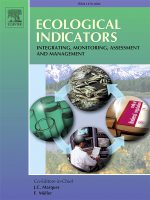Profile
My PhD research aimed to integrate acoustic telemetry data from reef sharks and satellite remote sensing to consider the environmental drivers of shark movement.
Coral reef systems provide valuable habitats for shark and ray species but are facing unprecedented man-made pressures. These important marine predators play a vital role in the functioning of coral reef ecosystems and so a better understanding of habitat use, and how this alters with changing environmental conditions, is important for the conservation of both shark species and reefs themselves.
Plotting networks of animal movements is an innovative tool that is revealing important insights into ecological connectivity and wildlife behaviour. Because climate change is predicted to cause increased fluctuations in environmental conditions, by integrating environmental data into movement analysis techniques, and investigating how environmental factors can influence the movement dynamics and spatial networks of species, is important for future shark conservation and management.
Powerful, remotely-sensed satellite data are increasingly available to researchers. However so far, very little of this valuable data has been integrated with environmental data into wildlife movement analysis. My PhD research also investigated new methods for monitoring coral reef health to provide insights into how animal movement and social patterns are influenced by environmental change (for example, the El Niño–Southern Oscillation event during 2015-2016). These valuable data from my PhD studies can help policy makers with their management decisions for the conservation of the Chagos Archipelago’s highly mobile marine animals.
New technologies like satellite remote sensing are greatly improving our understanding of marine animals movement around their habitats, and help in conservation effort to protect them.
Biography
My Project
Other interests
My current research uses techniques developed from my PhD to investigate the movement of the European eels to develop predictive models to enable forecasting of eel movement and behaviour under a range of management scenarios, thus providing an evidence-driven tool to inform protection and passage strategies for this critically endangered species.
I am also interested in the effect research techniques, such as tagging and capture, have on the behaviour of marine fauna. It’s possible that research methods may affect an animal’s behaviour, which can in turn influence the results of the research. Understanding these changes and taking them into account is important when using these techniques before making any conclusions from the results of the data.
Finally, I’m also interested in the use of tagging technologies on cetaceans, particularly in the areas of behavioural response and foraging ecology.
My Publications

Environmental DNA Helps Reveal Reef Shark Distribution Across a Remote Archipelago
Dunn, N., Curnick, D.J., Carbone, C., Carlisle, A.B., Chapple, T.K., Dowell, R., Ferretti, F., Jacoby, D.M.P., Schallert, R.J., Steyaert, M., Tickler, D.M., Williamson, M.J., Block, B.A., Savolainen, V. (2023). Environmental DNA helps reveal reef shark distribution across a remote archipelago. Ecological Indicators.

Monitoring Shallow Coral Reef Exposure to Environmental Stressors Using Satellite Earth Observation: the Reef Environmental Stress Exposure Toolbox (RESET).
Williamson, M.J., Tebbs,E.J., Dawson, T.P., Thompson, H.J., Head, C.E.I., Jacoby, D.M.P. (2022). Monitoring shallow coral reef exposure to environmental stressors using satellite earth observation: the reef environmental stress exposure toolbox (RESET). Remote Sensing Ecology and Conservation.

Application of Earth Observation Data and Google Earth Engine for Monitoring Coral Reef Exposure to Environmental Stressors
Williamson, M.J., Tebbs, E.J., Thompson, H.J., Dawson, T.P., Head, C.E.I., Jacoby, D.M.P. (2021). Application of earth observation data and Google Earth Engine for monitoring coral reef exposure to environmental stressors. Remote Sensing.

A Review of a Decade of Lessons From One of the World’s Largest MPAs: Conservation Gains and Key Challenges
Hays, G.C., Koldewey, H.J., Andrzejaczek, S., Attrill, M.J., Barley, S., Bayley, D.T.I., Benkwitt, C.E., Block, B., Schallert, R.J., Carlisle, A., Carr, P., Chapple, T.K., Collins, C., Diaz, C., Dunn, N., Dunbar, R.B., Eager, D.S., Engel, J., Embling, C.B., Esteban, N., Ferretti, F., Foster, N.L., Freeman, R., Gollock, M., Graham, N.A.J., Harris, J.L., Head, C.E.I, Hosegood, P., Howell, K.L., Hussey, N.E., Jacoby, D.M.P., Jones, R., Pilly, J.S., Lange, I.D., Letessier, T.B., Levy, E., Lindhart, M., McDevitt-Irwin, J.M., Meekan, M., Meeuwig, J.J., Micheli, F., Mogg, A., Mortimer, J.A., Mucciarone, D.A., Nicoll, M.A., Nuno, A., Perry, C., Preston, S.G., Rattray, A.J., Robinson, E., Roche, R., Schiele, M., Sheehan, E.V., Sheppard, A., Sheppard, C., Smith, A.L., Soule, B., Spalding, M., Stevens, G.M.W., Steyaert, M., Stiffel, S., Taylor, B.M., Tickler, D., Trevail, A.M., Trueba, P., Turner, J., Votier, S., Wilson, B., Williams, G., Williamson, B., Williamson, M.J., Wood, H. and Curnick, D.J. (2020) A review of a decade of lessons from one of the world’s largest MPAs: conservation gains and key challenges. Marine Biology.

Satellite Remote Sensing in Shark and Ray Ecology, Conservation and Management
Williamson, M. J., Tebbs, E. J., Dawson, T. P., & Jacoby, D. M. (2019). Satellite remote sensing in shark and ray ecology, conservation and management. Frontiers in Marine Science, 6, 135.
